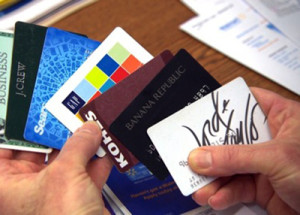
By Sheryl A. Fernandez, Paralegal
Posted on 12-7-2018
CATEGORIES: Business Law
In making my first trip of the season to the mall, I was reminded of my many years in retail. The bustle of the holidays, the increase in customers, longer hours, holiday décor and of course the repeat of Christmas songs that stick in your head long after your shift is over. Along with the fun, there is the push to get customers to sign up for store credit cards.
You will no doubtably hear something like, “you can save 10% by opening a store credit account” as the clerk rings up your purchases. This has become common place for many retailers, but don’t get fooled. As good as $30.00 off sounds on your $300.00 purchase, you may end up spending much more in the long run. Stores make a lot of money off the interest that accrues from their store cards; thus, they offer employees great incentives to get customers signed up.
First of all, most of the retailers will only give you that first-time sign-up discount if you are approved; and, most of the time you have to put that purchase on the card. This is not to mention that if you don’t pay off the balance within the 25-31 day cycle, you could end up paying a significant amount of interest. For those who have an average credit score, Target’s Annual Percentage Rate (APR) is 22.9%, Walmart’s is 24.9%, Banana Republic charges 24.9%, and Home Depot can charge up to 26.9%. This means if you carry even small balance for an extended period of time, you may very well end up paying more in interest than you saved with the discount. It is also important to remember that maintaining multiple charge cards with low spending limits can lower your credit score.
Store credit cards are not all bad though. For example, Home Depot is currently running a “6 months, no interest” deal for purchases over $299.00; so, if you pay off your balance before May of 2014, you don’t pay the high interest rate. Target gives you 5% off every time you use your Target card, along with extra savings coupons for reaching a certain spending limit. Target also has a program they call Take Charge of Education which allows for you to designate 1% of your Target Card purchases to a K-12 school of your choice. Banana Republic cards offer the added benefit of being able to be used at Gap, Old Navy, Piperlime and Athleta stores. They also have special deals and early notifications for card holders, such as no charge for shipping or the ability to get certain deals before those non-cardholders.
Although there are some benefits to opening and using an individual store credit card, the best bang for your buck will most likely be a bank issued credit card. Look for those that offer some type of rewards program like airline points or cash back. In contrast to the store cards and their remarkably high interest rates; Chase offers their United Mileage Plus card with no annual fee and an average APR of 16%. Along with a lower interest rate and more flexibility in where you can make purchases; it offers immediate bonus miles and extras like a free checked bag.
As with eating sweets and yummy food on Christmas; using credit is about moderation and making smart choices. Store credit cards can be used as a special treat for an extra discount or an exclusive offer; but, remember to use them sparingly, and pay off the balances immediately; otherwise, that so called discount may end up costing you more in the long run.
As much as we would have liked to, we did not get paid by any of the companies mentioned in this article nor do we represent them.
Recent:
Categories
Archive
Aug 2025
Jul 2025
Jun 2025
May 2025
Apr 2025
Mar 2025
Feb 2025
Jan 2025
Dec 2024
Nov 2024
Oct 2024
Sep 2024
Aug 2024
Jul 2024
Jun 2024
May 2024
Apr 2024
Mar 2024
Feb 2024
Jan 2024
Dec 2023
Nov 2023
Oct 2023
Sep 2023
Aug 2023
Jul 2023
Jun 2023
May 2023
Apr 2023
Mar 2023
Feb 2023
Jan 2023
Dec 2022
Nov 2022
Oct 2022
Sep 2022
Aug 2022
Jul 2022
Jun 2022
May 2022
Apr 2022
Mar 2022
Feb 2022
Jan 2022
Dec 2021
Nov 2021
Oct 2021
Sep 2021
Aug 2021
Jul 2021
Jun 2021
May 2021
Apr 2021
Mar 2021
Feb 2021
Jan 2021
Dec 2020
Nov 2020
Oct 2020
Sep 2020
Aug 2020
Jul 2020
Jun 2020
May 2020
Apr 2020
Mar 2020
Feb 2020
Jan 2020
Dec 2019
Dec 2018
Jul 2018
Dec 2017
Oct 2017
Jul 2017
Feb 2015
Jun 2014
Jan 2014